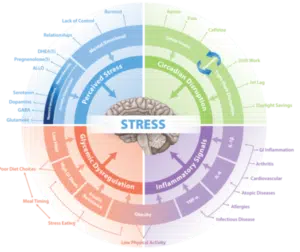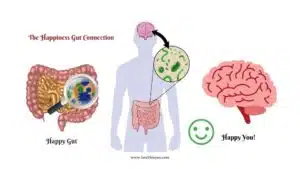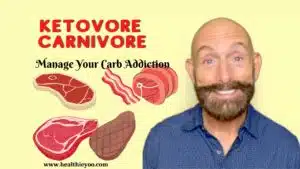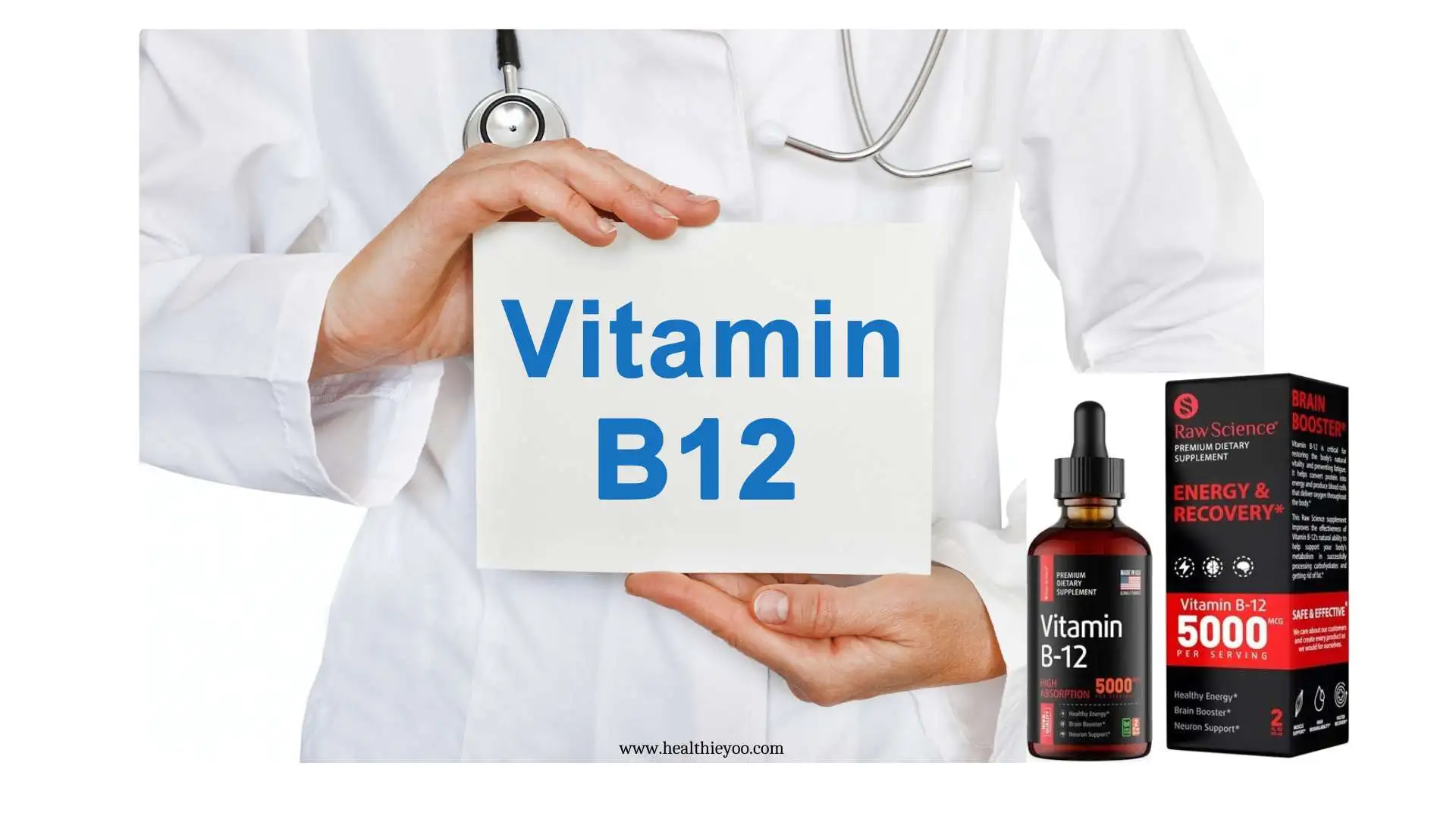In an era where health has become the cornerstone of our pursuits, a breakthrough emerges from the depths of scientific innovation. Raw Science, a pioneer in cutting-edge health solutions, stands at the forefront of this revolution with its groundbreaking approach to vitamin B12 supplementation. This isn’t just about pills or injections; this is about redefining the landscape of how we nourish our bodies. Vitamin B12, often overshadowed in the clamor of trendy health solutions, plays a pivotal role in our overall well-being. From supporting nerve function to aiding in red blood cell formation, its significance is undeniable. As you delve deeper, prepare to discover how Raw Science is reshaping the way we understand and embrace this essential nutrient through vitamin B12 drops – energy supplements for men and women.
A Close Look at Raw Science's B12 Vitamin Drops as Energy Supplements for Men and Women
Raw Science’s Vitamin B12 energy supplement or drops represent the pinnacle of modern nutritional science for men and women. Presented in a meticulously crafted formulation, it promises not only to deliver the essential vitamin but also to ensure its optimal absorption and utilization by the body. Encased in eco-friendly packaging, each dose is a testament to the brand’s commitment to both individual health and environmental responsibility.
Pros of Raw Science Vitamin B12 Drops as Energy Supplements for Men and Women
High Bioavailability
Leveraging advanced absorption technology, Raw Science ensures the body effectively uses every microgram of B12 ingested.
Sustained Release
Designed for gradual absorption, this product guarantees consistent B12 levels throughout the day, combatting the highs and lows often associated with other supplements.
Vegan and Vegetarian Friendly
Derived from 100% plant-based sources, it caters to those with strict dietary preferences without compromising on quality or efficacy.
Eco-conscious Packaging
With an emphasis on sustainability, the product is housed in recyclable materials, underscoring Raw Science’s commitment to a healthier planet.
Cons of Raw Science Vitamin B12 Drops as Energy Supplements for Men and Women
Price Point
Given its premium ingredients and advanced formulation, the product might come at a higher price compared to standard B12 supplements on the market.
Availability
As a sought-after product, stock might run out quickly, making consistent availability a potential concern for some consumers.
Customer Testimonials from Raw Science for Vitamin B12 drops - Energy Supplements
- “Never before have I felt such a tangible difference in energy levels. Raw Science’s B12 is a game-changer.”
- “As a vegan, finding a trustworthy B12 source was a challenge. Raw Science has put those concerns to rest.”
- “The sustainable packaging just adds another reason to love this product. Effective and eco-friendly? Count me in!”
- “Having tried numerous B12 supplements, I can confidently say Raw Science’s stands out in terms of both quality and efficacy. Within weeks, I noticed an improvement in my mood and energy.”
- “The sustained release technology is phenomenal. I no longer experience that midday slump. Raw Science has really nailed it with this product.”
- “The commitment to purity and clean formulations is evident. No more worrying about unwanted fillers or additives. It’s just pure, potent B12.”
- “The fact that they cater to vegetarians and vegans without compromising on the product’s effectiveness is truly commendable. It’s been a game-changer for my daily regimen.”
- “Their eco-friendly approach, right from the product to the packaging, makes me feel good about my purchase. It’s heartening to see a brand that cares about the planet as much as individual health.”
What People Highlight The Most About Raw Science Vitamin B12 Drops as Energy Supplements
Upon analyzing the feedback, a few consistent themes emerge about what customers particularly appreciate:
Effectiveness
Users often report tangible benefits including increased energy levels, improved mood, and overall well-being after including Raw Science’s B12 supplement from Raw Science in their diet, rated as one of the best energy supplements for men and women.
Purity and Quality
Customers are reassured by the brand’s commitment to delivering clean, high-quality formulations that are devoid of unnecessary fillers or harmful additives.
Eco-consciousness
The sustainable, eco-friendly packaging and the brand’s overall approach to environmental responsibility have garnered significant appreciation, resonating with today’s conscious consumers.
Inclusivity
The brand’s dedication to catering to various dietary preferences, especially vegetarians and vegans, has been a standout feature for many, filling a significant gap in the market.
In summation, Raw Science’s Vitamin B12 product appears to be carving a niche for itself in the supplement market, offering a potent blend of efficacy, innovation, and responsibility. While it has its unique set of challenges, the overall consensus leans heavily towards the positive.
The Raw Science Advantage: Where Innovation Meets Nutrition
Understanding Vitamin B12: The Essential Nutrient to Boost Energy And Focus
Vitamin B12, also known as cobalamin, often wears the cloak of obscurity in our daily diets, yet its influence on our bodies is vast and vital. Let’s dive deep into the science and significance of this indispensable nutrient.
The Science Behind Vitamin B12
At its core, vitamin B12 is a water-soluble vitamin that plays a crucial role in our body’s cellular metabolism. It’s intricately involved in DNA synthesis, as well as the metabolism of fatty acids and amino acids. Structurally, B12 is the most chemically complex of all the vitamins, featuring a unique cobalt atom at its center, which gives it its distinct name – cobalamin.
Significance of Vitamin B12 in Bodily Functions
Neurological Function: B12 is pivotal for the maintenance of the nervous system. It aids in the formation of the protective myelin sheath around nerves, ensuring swift and efficient nerve-impulse transmission.
Red Blood Cell Formation
In the bone marrow, where red blood cells are produced, B12 is indispensable. A deficiency can lead to megaloblastic anemia, a condition where the blood cells become enlarged and dysfunctional.
DNA Synthesis and Repair
As a co-factor in DNA synthesis, B12 ensures our genetic material is replicated accurately during cell division.
Energy Production
B12 is involved in the conversion of homocysteine to methionine, a crucial step in the Krebs cycle that generates energy within our cells.
Bone Health and Osteoporosis Prevention
Recent studies suggest a relationship between B12 levels and bone density. Adequate B12 can potentially play a role in maintaining healthy bone mass.
The Dietary Challenge of Vitamin B12
While B12 is present in various food sources, particularly animal products, its bioavailability can be an issue. This means that while the food might contain B12, our body might not always absorb or utilize it efficiently. Vegetarians and vegans face an even greater challenge, as plant-based foods typically lack sufficient B12.
Furthermore, certain populations, such as the elderly or those with specific digestive maladies like atrophic gastritis, may have impaired B12 absorption. This makes them particularly vulnerable to deficiency, even if their dietary intake seems adequate.
In conclusion, understanding vitamin B12 is akin to unlocking a cornerstone of holistic health. While its presence in our body might be minuscule, its impact is monumental. The challenges of obtaining sufficient B12 through diet alone underscore the importance of awareness and proactive health choices, ensuring our bodies remain fueled by this essential nutrient.
Sources of Vitamin B12
Vitamin B12, also known as cobalamin, is a vital nutrient essential for the proper functioning of numerous bodily processes. Given its significance, understanding its sources is crucial to ensure optimal intake. Here’s a breakdown:
Natural Dietary Sources
Animal Products: Vitamin B12 is naturally found in animal products. The primary sources include:
- Meat: Especially in organ meats like liver and kidney.
- Fish: Particularly in fatty fish like salmon and trout.
- Poultry: Chicken and turkey are good sources.
- Dairy: Milk, cheese, and yogurt.
- Eggs: Particularly in the yolk.
These foods not only provide vitamin B12 but also come packed with other essential nutrients, making them a comprehensive dietary choice.
Plant-based and Fortified Options
Traditionally, vitamin B12 isn’t present in plant foods. However, with the rising awareness about the dietary needs of vegetarians and vegans, various fortified foods have become available:
- Fortified Cereals: Many breakfast cereals now come fortified with vitamin B12.
- Plant-based Milks: Almond, soy, and rice milks often have added B12.
- Meat Substitutes: Products like tofu or tempeh are sometimes fortified with this vitamin.
- Nutritional Yeast: Often used in vegan cooking, some varieties are fortified with B12.
Importance of Supplementation
Who Needs It? While many can get their B12 from diet alone, certain groups might struggle. This includes strict vegetarians, vegans, elderly individuals, and those with certain medical conditions that impact B12 absorption.
- Forms of Supplements: B12 supplements are available in various forms, including capsules, tablets, sublingual drops, and even injections.
- Benefits: For those at risk of deficiency, supplementation ensures that they maintain healthy B12 levels, supporting nerve function, red blood cell formation, and overall energy.
In conclusion, while there are multiple sources of vitamin B12, the key is to choose the ones that align with one’s dietary preferences and needs. Regular monitoring, especially for those at risk, ensures that levels remain within the recommended range, promoting optimal health.
Diagnosing and Treating Vitamin B12 Deficiency
Vitamin B12 deficiency, while common, can lead to a range of health problems, some of which might become severe if left unaddressed. Recognizing the signs, getting an accurate diagnosis, and implementing appropriate treatment are therefore essential steps to manage and mitigate the impacts of this deficiency.
1. Diagnosing B12 Deficiency
Blood Tests
The primary means of diagnosing a vitamin B12 deficiency is through blood tests. These tests can measure the concentration of vitamin B12 in the blood directly. A lower-than-normal amount indicates a deficiency.
Additional Markers
Apart from direct B12 levels, doctors often look at elevated levels of homocysteine or methylmalonic acid (MMA) in the blood, which can also indicate a deficiency.
Physical Symptoms
While not diagnostic on their own, symptoms like fatigue, weakness, constipation, loss of appetite, weight loss, poor memory, or numbness and tingling can prompt a doctor to check B12 levels.
2. Treatment Options
Oral Supplements
These are over-the-counter tablets, capsules, or sublingual preparations (dissolved under the tongue) that can help restore B12 levels in many individuals.
B12 Injections
In cases where the deficiency is severe or when there are absorption issues in the digestive tract, doctors might prescribe B12 shots. These injections bypass the digestive system and provide a direct boost of the vitamin.
Dietary Changes
Incorporating more B12-rich foods can be an effective and natural way to address mild deficiencies, especially when the cause is dietary.
3. Importance of Early Intervention
Preventing Complications
Left untreated, B12 deficiency can lead to severe nerve damage, anemia, and other health complications.
Reversible vs. Irreversible Damage
While some symptoms like fatigue might be reversible with prompt treatment, others, especially neurological changes, can become permanent if left unchecked for too long.
Overall Health Impact
Addressing a B12 deficiency early can prevent a domino effect of health issues. As B12 is involved in red blood cell formation, nerve function, and DNA synthesis, its deficiency can have widespread repercussions.
In summary, recognizing and addressing vitamin B12 deficiency is of paramount importance. Regular check-ups, especially for those at higher risk, can lead to early detection and intervention, ensuring that the body remains in its optimal state of function and health.
Health Benefits of Vitamin B12 For Energy Boost
Vitamin B12, or cobalamin, is an indispensable nutrient that goes beyond merely preventing deficiencies. It plays a pivotal role in various physiological functions, supporting overall health and well-being. Let’s delve into some of the myriad health benefits of vitamin B12:
1. Beyond Preventing Deficiency
While the primary emphasis regarding vitamin B12 often revolves around preventing or treating deficiencies, it’s essential to recognize that adequate B12 levels can promote overall well-being and vitality.
Energy Production
B12 plays a key role in the metabolism of every cell, aiding in energy production. This is why fatigue is a common symptom of deficiency.
DNA Synthesis
It’s crucial for the normal synthesis of DNA, ensuring the smooth and regular function of all cells, especially rapidly dividing ones like blood cells.

2. Supporting Cognitive Function and Memory
Research suggests a strong link between vitamin B12 and the nervous system:
Neurological Function
Vitamin B12 is vital for the maintenance of the myelin sheath, which surrounds and protects nerve fibers. This sheath’s integrity is essential for the rapid and smooth transmission of nerve impulses.
Memory and Mood
There is evidence to suggest that adequate B12 levels can support memory function and are associated with better mood regulation. Conversely, a deficiency can lead to mood disturbances and cognitive impairments.
3. Vitamin B12 and Heart Health
Vitamin B12, in tandem with other B vitamins, notably B6 and folic acid, has a crucial role in heart health:
Homocysteine Levels
Vitamin B12 helps in the metabolism of homocysteine, an amino acid. Elevated levels of homocysteine have been linked to an increased risk of heart disease.
Cardiovascular Support
By helping keep homocysteine levels in check, B12 indirectly supports cardiovascular health, potentially reducing the risk of heart disease and stroke.
In conclusion, vitamin B12 offers a plethora of benefits, underpinning various bodily functions. Ensuring adequate intake can thus be seen as an investment in overall health, enhancing everything from our energy levels and mood to the health of our heart and brain.
Vitamin B12 and Aging
Aging is a natural process accompanied by various physiological and metabolic changes. Among these changes is the body’s ability to absorb and utilize certain nutrients, including vitamin B12. Let’s examine the relationship between vitamin B12 and aging, and the crucial factors older adults should be aware of:
1. Changing Vitamin B12 Requirements with Age
Increased Needs
As we age, the body’s requirement for certain nutrients might change. While the recommended daily amount of vitamin B12 remains relatively constant for adults, older individuals might effectively need more due to decreased absorption capabilities.
Risk of Deficiency
Older adults are at a heightened risk of B12 deficiency, not necessarily because of decreased intake, but often due to reduced absorption.
2. Age-related Changes in Digestion and B12 Absorption
Stomach Acid Reduction
Vitamin B12 in food is bound to protein. To absorb B12, our stomach produces acid and enzymes that separate the vitamin from the protein, making it available for absorption. As we age, the stomach’s acid production decreases, which can lead to reduced B12 absorption.
Atrophic Gastritis
Many older adults develop a condition called atrophic gastritis, which affects the stomach lining’s ability to produce acid. This condition further diminishes B12 absorption from dietary sources.
Medications
Some commonly prescribed medications for older adults, such as proton pump inhibitors and antacids, can reduce stomach acid, impacting B12 absorption. Additionally, long-term use of metformin for diabetes can interfere with B12 uptake.
3. Strategies to Ensure Adequate Intake in Older Adults
Fortified Foods
Consuming foods fortified with vitamin B12, such as cereals, can be a more effective way for older adults to get the nutrients, as B12 in fortified foods is not bound to protein and doesn’t require stomach acid for absorption.
B12 Supplements
Given the absorption challenges, B12 supplements (either as oral tablets or sublingual preparations) can be an efficient way to ensure adequate intake. They offer a direct source of the vitamin, bypassing potential digestive inefficiencies.
Regular Screening
Due to the increased risk of deficiency, older adults should consider regular B12 level screenings. Early detection of low levels can help initiate timely intervention, ensuring optimal health and well-being.
In conclusion, understanding the intricate relationship between aging and vitamin B12 can pave the way for better health decisions. As with many aspects of health, proactive measures, regular check-ups, and informed dietary choices can make all the difference in ensuring that older adults maintain adequate B12 levels.
Myth vs. Fact: Debunking Common Misconceptions about Vitamin B12
The realm of nutrition is replete with myths and misconceptions, and vitamin B12 is no exception. Let’s set the record straight by debunking some common myths and providing the factual counterparts.
1. Myth: Only meat-eaters are at risk of vitamin B12 deficiency.
Fact: While it’s true that animal products are primary sources of B12, vegetarians and especially vegans can be at risk if they don’t consume fortified foods or supplements. Moreover, due to absorption issues, even meat-eaters, particularly older adults, can become deficient.
2. Myth: All plant foods contain vitamin B12.
Fact: Naturally occurring B12 is typically not found in plant foods. Some believe that foods like spirulina or fermented soy products are good sources, but they contain B12 analogs, which are not usable by the human body and can even interfere with normal B12 absorption and metabolism.
3. Myth: Taking excessive B12 supplements can boost energy for everyone.
Fact: B12 supplements can indeed boost energy in those who are deficient. However, for those with adequate B12 levels, taking more won’t necessarily provide an energy surge. It’s always best to consult with a healthcare professional before starting supplementation.
4. Myth: B12 injections are superior to oral supplements.
Fact: B12 injections can provide a direct boost of the vitamin, bypassing the digestive system, and are beneficial for those with severe deficiency or absorption issues. However, for many individuals, oral supplements are effective and less invasive.
5. Myth: B12 deficiency is a minor concern and doesn’t have significant consequences.
Fact: A prolonged deficiency in B12 can lead to severe health complications, including megaloblastic anemia, nerve damage, and cognitive issues. It’s essential to address a deficiency promptly.
6. Myth: You don’t need regular B12 if you’ve had a high-dose shot once.
Fact: While B12 shots can provide a significant boost, the body’s storage and requirements vary. It’s essential to monitor B12 levels and adjust intake accordingly.
7. Myth: Your body absorbs all the B12 you consume.
Fact: Absorption efficiency can vary based on several factors, including age, genetics, and the presence of certain medical conditions. Just because you’re consuming adequate B12 doesn’t mean your body is absorbing it all.
In the journey to optimal health, accurate information is the best ally. By debunking these myths about vitamin B12, individuals can make informed decisions that best support their well-being.
Vitamin B12: Frequently Asked Questions (FAQ)
1. What is vitamin B12?
Vitamin B12, also known as cobalamin, is a water-soluble vitamin that plays a key role in the functioning of the brain and nervous system, the formation of red blood cells, DNA synthesis, and energy metabolism.
2. Why is vitamin B12 important?
B12 is crucial for many core processes in the body. It helps in the production of DNA and RNA, works with other B vitamins to form red blood cells, aids in iron function, and improves mood regulation, among other roles.
3. What are the symptoms of a B12 deficiency?
Symptoms can range from fatigue, weakness, constipation, loss of appetite, and weight loss to nerve problems like numbness and tingling, muscle weakness, and balance issues. Severe deficiency can lead to anemia, nerve damage, and neurological problems like memory loss.
4. What foods are rich in vitamin B12?
B12 is primarily found in animal products. These include fish, meat, poultry, eggs, milk, and other dairy products. Some fortified foods, like breakfast cereals, can also contain B12.
5. Can vegetarians and vegans get enough vitamin B12?
Since B12 is predominantly found in animal products, vegetarians and vegans might be at risk of deficiency. They should seek out foods fortified with B12 or consider taking a B12 supplement.
6. How much B12 do I need daily?
The recommended daily amount varies by age, dietary habits, and other factors. In general, adults are recommended to consume 2.4 micrograms per day. Pregnant and breastfeeding women may require more. Always consult with a healthcare professional for personalized recommendations.
7. Are there any side effects to taking too much B12?
While B12 is water-soluble and excess amounts are generally excreted through urine, extremely high doses taken over prolonged periods might have adverse effects. It’s always best to adhere to recommended dosages and consult a healthcare provider if in doubt.
8. Can I get B12 from plant-based sources?
Naturally, B12 is not present in plant foods. However, certain foods like fortified plant-based milk, meat alternatives, and breakfast cereals can contain synthetically added B12.
9. What's the difference between B12 shots and oral supplements?
B12 shots are intramuscular injections that provide a direct dose of vitamin B12, typically used to treat significant deficiencies. Oral supplements, taken by mouth, are suitable for most people to maintain healthy B12 levels. The best method depends on individual needs and a doctor’s recommendation.
10. Who is most at risk of a B12 deficiency?
Older adults, vegetarians, vegans, individuals with certain medical conditions (e.g., pernicious anemia, atrophic gastritis, and Crohn’s disease), and those who’ve undergone specific surgeries (like gastric bypass) are at a higher risk and should monitor their B12 levels regularly.
Remember, while this FAQ provides general information, always consult with a healthcare professional about specific concerns or conditions related to vitamin B12.
Conclusion
In the expansive realm of nutrition and supplementation, Raw Science has emerged as a beacon of innovation, particularly in the domain of vitamin B12. Their groundbreaking approach isn’t just about providing a supplement; it’s about revolutionizing the way we perceive and access this vital nutrient.
Through rigorous research and the harnessing of advanced technology, Raw Science has managed to create B12 formulations or energy drops that stand out in the crowded market as energy supplements for men and women. By addressing not only the needs of the general populace but also the specific requirements of niche groups, such as vegans and vegetarians, they have showcased a commitment to holistic health and inclusivity.
But beyond the superior quality of their products lies a message: health is an investment. It’s about making conscious choices today that will pay dividends in well-being tomorrow. As we’ve navigated the intricacies of vitamin B12, from its sources to its myriad health benefits, one thing remains clear – ensuring optimal levels of this nutrient can be transformative.
For those seeking to elevate their health journey, the world of Raw Science’s vitamin B12 drops beckons. It’s not just about a pill or a supplement; it’s about embracing a lifestyle of informed, proactive health decisions. So, as we conclude, we encourage our readers to delve deeper, explore the Raw Science range, and witness firsthand the merger of science, health, and innovation. Your body, mind, and future self will thank you.
Sources
- https://ods.od.nih.gov/factsheets/VitaminB12-HealthProfessional/
- https://www.who.int/topics/nutrition/en
- https://www.mayoclinic.org/diseases-conditions/depression/expert-answers/vitamin-b12-and-depression/faq-20058077
- https://www.webmd.com/diet/vitamin-b12-deficiency-symptoms-causes
- https://www.health.harvard.edu/a_to_z/vitamin-b12-deficiency-a-to-z
Disclosure – This is a sponsored post. The product belong to a third party, and we have neither used nor endorsed any products. The views expressed are of the sponsor/author/third party and not of Healthieyoo’s editorial team. The testomonials are as provided by the sponsor/ third party and not collected by Healthieyoo. We disclaim any and all liability to any party, person, company, or product for any direct, indirect, implied, punitive, special, incidental, or consequential damages arising either directly or indirectly due to the use of content published in this article. The publishers of this website take no responsibility for any health issues, personal injury, death, disability, or any other harm due to the content on our website or any advice or opinion expressed on our website. Please consult your healthcare professional before making any decision related to your health. Please also read our medical disclaimer”.
Related Posts

13 Signs You May Be Low In B Vitamins – B6, B9 Or B12







